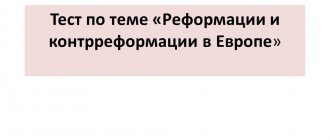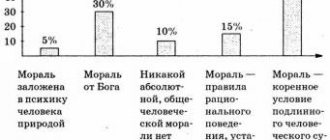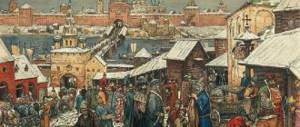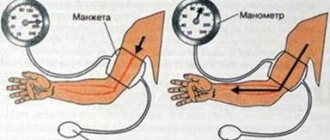History test Political fragmentation in Rus' 6th grade
History test Political fragmentation in Rus' for 6th grade students with answers. The test includes 2 options, each with 10 tasks.
1 option
1. Select three causes of political fragmentation from the list. Write down the numbers under which they are indicated.
1) natural economy2) climate change3) economic development of individual regions and territories4) development of information technology5) change in the status of the ruler
6) increasing the privileges of the peasantry
2. State a positive consequence of fragmentation.
1) princely strife2) economic crises3) cultural flourishing
4) struggle for primacy between individual regions of the country
3. With the end of the reign of which prince, do historians believe, the period of fragmentation began?
1) Vladimir Monomakh2) Mstislav the Great3) Yaroslav the Wise
4) Vladimir Svyatoslavich
4. What income of the boyars became the main one during the period of fragmentation?
1) military spoils 2) tribute collected from subject lands 3) exploitation of the population of subject estates
4) trade with European countries
5. Write down the term in question.
The type of economy aimed at satisfying one's own needs and not focused on trade is called __________.
6. The official title of the head of the church in Ancient Rus' during the period of fragmentation
1) head of the Russian Orthodox Church2) Metropolitan of the Russian Orthodox Church3) Metropolitan of Kiev and All Rus'
4) Patriarch of Kyiv and All Rus'
7. Remember the main provisions that relate to the work “The Tale of Igor’s Campaign”.
1) In what year did Prince Igor’s campaign described in the work take place? 2) In the fight against which people was Prince Igor’s army defeated?
3) The author, discussing the fate of Prince Igor, set as an example to other princes the prince - the baptizer of the Old Russian state _______________.
8. Using a map reflecting the period of fragmentation of Ancient Russia, select Russian principalities and lands ( three names) from the list. Write down the numbers under which they are indicated.
1) Chernigovskoye2) Mordvinskoye3) Polish4) Galitskoye5) Vladimir-Suzdal
6) Siberian
9. With which European countries did the principalities of Ancient Russia have active trade relations? Select three countries. Write down the numbers under which they are indicated.
1) Czech Republic2) China3) Mongolia4) Poland5) Hungary
6) Arab Caliphate
10. The centers of chronicle writing in the Old Russian state were church institutions, or __________.
Test with answers: “Political fragmentation in Rus'”
1. The prince who won the Battle of the Ice: a) Alexander Nevsky + b) Yuri Dolgoruky c) Igor Svyatoslavich
2. Which prince was the creator of the Lithuanian state: a) Vytautas b) Mindovg + c) Gediminas
3. What was evidenced by the large number of birch bark letters found by archaeologists in Novgorod: a) the absence of books in Rus' b) the development of crafts c) the education of the population +
4. Congress of the Mongolian nobility: a) kurultai + b) noyon c) yurt
5. The consequence of Prince Gediminas’ annexation of the Russian lands was: a) a ban on the use of the Russian language b) the abolition of the previous management system c) the imposition of tribute on Russian lands +
6. Horde rule: a) did not affect the pace of development of Rus' b) significantly slowed down the development of Rus' + c) accelerated the development of Rus'
7. The name of Prince Alexander Yaroslavich is associated with victories in: a) 1239-1240 b) 1237-1238 c) 1240-1242 +
8. One of the consequences of the anti-Horde uprisings was: a) transfer of the right to collect tribute to the Russian princes + b) abolition of tribute payment c) abolition of tax privileges of the Russian Church
9. The first battle of Russian squads with the Mongols took place in an alliance with: a) with the Pechenegs b) with the Khazars c) with the Polovtsians +
10. The first meeting of Russian squads with the Mongols took place on: a) r. Don b) r. Kalka + c) r. Volga
11. Which of the listed princes ruled earlier than others: a) Yaroslav the Wise + b) Vladimir Monomakh c) Alexander Nevsky
12. Which of the listed architectural buildings had many chapters: a) Church of the Savior on Nereditsa b) Cathedral of St. Sophia of Kyiv + c) Church of St. George in Ladoga
13. Which of the following events occurred earlier than the others: a) The Baptism of Rus' + b) the battle on Lake Peipsi c) the battle on the Kalka River
14. The battle, which went down in history under the name “Battle of the Ice,” took place on the ice of this lake: a) Ilmen b) Nevsky c) Chudskoye +
15. During the Battle of the Neva, the Russian army fought against: a) Swedes + b) Danish knights c) German knights
16. Khan Batu called “an evil city”: a) Torzhok b) Kozelsk + c) Kolomna
17. The Battle of the Kalka River took place in: a) 1206 b) 1266 c) 1223 +
18. At the beginning of the 13th century, the ruler of the Mongolian state took the name: a) Subedei b) Genghis Khan + c) Temujin
19. The political form of the yoke was manifested in: a) payment of tribute from Russian lands b) payment of the “blood tax” c) issuance of a label for all types of reigns +
20. The foundation of the Golden Horde state is associated with the name of: a) Kublai b) Batu + c) Genghis Khan
21. Batu’s second campaign against Rus' took place in: a) Southern Rus' + b) North-Eastern Rus' c) North-Western Rus'
22. The first mention of Moscow was in: a) 1223 b) 1147 + c) 1097
23. The reason for the decline in population in Russian lands in the second half of the 13th century. is: a) natural disasters b) raids of German and Swedish knights c) Mongol-Tatar invasion +
24. Batu’s first campaign against Rus' took place in: a) 1239-1240. b) 1237-1238 + c) 1223-1224
25. The prince invited to Novgorod: a) controlled economic activities b) was responsible for collecting taxes from the population c) led the defense of the principality +
26. In 1185, Igor Svyatoslavich made an unsuccessful campaign against: a) Khazars b) Polovtsians + c) Tatars
27. One of the reasons for the collapse of the united Old Russian state was: a) the possibility of independent economic development of individual principalities + b) the unfriendly attitude of Byzantium towards Kyiv c) the forced introduction of Christianity
28. One of the reasons for political fragmentation: a) adoption of Christianity b) strengthening of the power of the monarch c) lack of strong economic ties between regions of the country +
29. One of the reasons for political fragmentation: a) the growth of the privileges of the nobility + b) the adoption of Christianity c) the increase in the privileges of the urban population
30. One of the reasons for political fragmentation: a) increasing the privileges of the urban population b) the dominance of subsistence farming + c) strengthening the power of the monarch
Option 1
1. Select three causes of political fragmentation from the list. Write down the numbers under which they are indicated.
1) natural economy 2) climate change 3) economic development of individual regions and territories 4) development of information technology 5) change in the status of the ruler 6) increase in the privileges of the peasantry
2. State a positive consequence of fragmentation.
1) princely strife 2) economic crises 3) cultural flourishing 4) struggle for primacy between individual regions of the country
3. With the end of the reign of which prince, do historians believe, the period of fragmentation began?
1) Vladimir Monomakh 2) Mstislav the Great 3) Yaroslav the Wise 4) Vladimir Svyatoslavich
4. What income of the boyars became the main one during the period of fragmentation?
1) military booty 2) tribute collected from subject lands 3) exploitation of the population of subject estates 4) trade with European countries
5. Write down the term in question.
The type of economy aimed at satisfying one's own needs and not focused on trade is called __________.
6. The official title of the head of the church in Ancient Rus' during the period of fragmentation
1) head of the Russian Orthodox Church 2) Metropolitan of the Russian Orthodox Church 3) Metropolitan of Kiev and All Rus' 4) Patriarch of Kiev and All Rus'
7. Remember the main provisions that relate to the work “The Tale of Igor’s Campaign”.
1) In what year did Prince Igor’s campaign described in the work take place? 2) In the fight against which people was Prince Igor’s army defeated? 3) The author, discussing the fate of Prince Igor, set as an example to other princes the prince - the baptizer of the Old Russian state _______________.
8. Using a map reflecting the period of fragmentation of Ancient Russia, select Russian principalities and lands ( three names) from the list. Write down the numbers under which they are indicated.
1) Chernigov 2) Mordvinian 3) Polish 4) Galician 5) Vladimir-Suzdal 6) Siberian
9. With which European countries did the principalities of Ancient Russia have active trade relations? Select three countries. Write down the numbers under which they are indicated.
1) Czech Republic 2) China 3) Mongolia 4) Poland 5) Hungary 6) Arab Caliphate
10. The centers of chronicle writing in the Old Russian state were church institutions, or __________.
§ 12. Political fragmentation in Rus'
GDZ ◄ GDZ on history ◄ GDZ. Russian history. Arsentiev. 6th grade◄
§ 12. Political fragmentation in Rus'
§ 12. Political fragmentation in Rus'
Question to point 1. What important events took place in the XI-XII centuries. in Germany, France, England?
In Western Europe, including France and Germany, feudal fragmentation began during this period. In England it was not fully there, but periodically there were wars between pretenders to the throne with both candidates relying on the largest feudal lords of the kingdom.
Question to point 2. What reasons, besides the dominance of subsistence farming, existed for the onset of a period of fragmentation in Western Europe?
Other reasons:
- the territories of large feudal lords became economically independent;
- royal power weakened;
- fragmentation was to the advantage of the Catholic Church, because it could play on the struggle of feudal lords with each other;
- trade ties between regions have weakened;
- The layer of knights, who grew rich from military spoils, strengthened.
What rights did large feudal lords have in their domains in Western Europe?
On their lands, feudal lords owned all the land, and in the High Middle Ages, they also owned the peasants who depended on them. They had the right to the results of the peasants' duties, could even sell them themselves, disposed of their property, had judicial power over the peasants and recruited their military detachments from them.
In your opinion, can an individual family live in a subsistence economy in our time?
A family can live in primitive conditions, and then live in isolation. This is how the Lykovs lived back in the 1970s.
But a modern person must buy almost everything. The same TV cannot be made at home.
What role did the Catholic Church play in Western Europe during the period of fragmentation?
During the period of fragmentation, the Catholic Church was the strongest political player and fought on equal terms with the strongest monarchs. At the same time, she often acted as an arbiter in disputes between feudal lords. The church's attempt to stop the wars between feudal lords is interesting, but not the fragmentation itself: the Pope intended to direct the military fervor of the knights against the Muslims, calling for the First Crusade.
Question for point 5. What was the role of the steppe inhabitants in the collapse of the Old Russian state?
The steppe inhabitants accelerated the collapse of the state, because in many strife they took the side of one or another prince. But they did not cause fragmentation: wars between the princes began without their participation, they only took advantage of the situation, ruining the Russian lands.
Questions for the paragraph
What connection existed between the economic development of individual lands and political fragmentation?
The cities grew richer, each of the large specific centers was able to exist independently, some even tried to surpass the capital. This helped the beginning of fragmentation, because many cities, and therefore principalities, could economically exist separately and did not need a single state.
What were the political reasons for the fragmentation of the Old Russian state?
Political reasons:
- after the congress of princes in Lyubech in 1097, the ladder system was abandoned; now each prince received part of his father’s land, therefore he did not care about the unity of the state, which he now had no chance to lead, but about the prosperity and independence of his inheritance;
- The boyars were now getting rich not at the expense of part of the tribute to the prince, but at the expense of their estates, and therefore they also only cared about the prosperity and independence of the estate in which the estates were located.
What do you think, which segments of the population and why were interested in liberating their lands from the power of Kyiv?
- For independence from Kyiv there were local princes, who thanks to this became independent rulers.
- Thanks to their independence, the boyars fought only for the interests of their principality, and not of distant Kyiv, they cared about the interests of this inheritance, along with which their estates grew rich.
- There were also townspeople in favor of independence, who benefited from a prince who protected only their interests.
- Only traders were against the formation of new borders, but with the weakening of trade routes they turned out to be weak.
- The peasants basically didn't care.
Select quotes from the text of the paragraph that confirm the creation of conditions for fragmentation in Rus'.
“The order of land ownership has changed.” “...princes and warriors lost the opportunity to enrich themselves through overseas trade.” “Trade between different parts of Rus' was poorly developed and irregular.” “Each land had its own veche, had its own elected government, its own people’s militia.”
What prevented the complete collapse of Rus'?
The idea of a unified Russian land continued to exist, many cultural figures called again for unity.
In addition, a single nationality continued to exist. The language remained unified, although the dialects differed more and more and over time could become separate languages. The customs remained similar, although they gradually diverged more and more from principality to principality.
What historical events are associated with the creation of “The Tale of Igor’s Campaign”?
“The Word...” describes the campaign of the Novgorod-Seversk prince Igor Svyatoslavich against the Polovtsians, undertaken with small forces in 1185.
How did public administration change in Rus' during the period of fragmentation?
The unified management system of the Old Russian state practically disappeared, but local systems largely copied it. Each appanage principality had its own prince, who relied on the squad and at the same time was forced to take into account its opinion (especially the opinion of the senior warriors - the boyars), as well as the city council.
We think, compare, reflect:
Do you think that political and trade ties between Rus' and other countries accelerated or slowed down its disintegration into separate lands? Explain your point of view.
In conditions of weakening trade along the main routes through the Dnieper and Volga, each appanage prince had his own trade and dynastic ties. This means that they were part of those very separate interests of each principality, concern for which accelerated the onset of fragmentation.
Compare the system of government of the principalities during the period of fragmentation with the system of government during the reign of Vladimir Monomakh in Kyiv.
The system of governing the principalities during the period of fragmentation basically repeated the system of governing Kiev during the reign of Vladimir Monomakh, although many lands had their own peculiarities.
Find out the role of the Church in maintaining the desire to restore unity in Rus' and in the countries of Western Europe.
The Church remained united, under the control of one metropolitan. Therefore, she encouraged the desire for unity. In addition, the church has traditionally opposed wars between Orthodox Christians. Many calls to stop strife came from church writers.
But the church did not have exactly such a role everywhere. For example, in Novgorod, the archbishop was elected by the veche, because he was more concerned about the orders of his voters, and not the metropolitan, because this archbishop was most often a champion of the independence of Novgorod, and not the subordination of this very Novgorod to Kyiv.
Was it possible, in your opinion, to prevent the onset of a period of fragmentation in Rus'? Explain your opinion.
Everything that led to fragmentation was not a conscious choice of people. They acted the way they did. And even the princes could not help but distribute lands to their sons, because this is how the worldview of themselves, their sons and their subjects was built. Therefore, fragmentation could hardly be prevented.
Using the Internet, prepare a presentation (tour) of one of the cities - capitals of individual Russian lands (optional).
The presentation “Vladimir on Klyazma” can be downloaded ►here.
§ 12. Political fragmentation in Rus'
◄§11
§13►
Test on history in 6th grade “Political fragmentation in Rus'”
Test in 6th grade on the topic “Political fragmentation in Rus'”
Goals:
— summarize and test students’ knowledge of the studied section; identify gaps;
— check the level of skill development:
- independent choice of schemes for converting text information
- the ability to “talk” to a source through asking questions”
- the skill of identifying cause-and-effect relationships of historical events and phenomena.
- Compiling informative messages with elements of analysis
Area of knowledge tested:
- Terminology on the topic studied
- Chronology of main events
- Relationship of facts
- Cause-and-effect relationships
- Reading the map
Progress of the test
Task No. 1.
Give definitions to the following concepts: feudal fragmentation, appanage, veche, republic, label.
Task No. 2.
1) Draw up a diagram yourself that reflects the consequences of Horde rule.
2) Draw up a diagram of the political and economic dependence of Rus' on the Golden Horde
Task No. 3
Working with a document.
Read an excerpt from “The Tale of Bygone Years” and answer the questions.
“...In the summer of 1097, Svyatopolk, and Vladimir, and David Igorevich, and Vasilko Rostislavich, and David Svyatoslavich, and his brother Oleg came and gathered in Lyubech to establish peace. And they turned to themselves, saying: “Why are we destroying the Russian land, creating hostility against ourselves, while the Polovtsians are tearing our land apart, rejoicing that there are wars between us to this day. From now on, we will unite into one heart and protect the Russian lands. Let everyone keep his fatherland..."
And on this they kissed the cross: “If anyone goes to war against anyone, then we will all fight against him...” And, having taken an oath, they went their separate ways...”
Questions:
- What events are narrated in the passage presented?
- Comment on the highlighted text? What is the purpose of the congress?
- What issues were resolved at the congress?
- How would you comment on the motto of the relationship between princes: “Let everyone keep his fatherland...”
- What consequences did this event have for the further historical development of Russia?
Task No. 4.
- Using the map, write a story about the growth of the territory of the Lithuanian-Russian state.
Task No. 5.
Match the events and dates:
Events Dates
- Battle of Lake Peipsi a) 1223
- Battle on the river Kalke b) 1240g.
- Battle of the Neva c) 1236-1242.
- Batya's invasion d) 1252-1263.
- Reign of Alexander Nevsky in Vladimir d) 1242
Task No. 6
Theoretical questions (one to choose from), give a reasoned answer
- Explain the reason for the defeat of the Russians and Cumans in the Battle of the Kalka River. Why was Rus' unable to cope with the Mongol-Tatar invasion?
- Explain why the period of political fragmentation in Rus' was a heyday for the Russian principalities?
Evaluation criteria
1) knowledge of basic concepts and phenomena on the topic;
2) skill in drawing up a logical diagram;
3) the ability to “talk” to a source through asking questions;
4) formulating a reasoned answer to a question with a generalization or conclusion;
5) using a map to explain historical events and phenomena;
6) the ability to identify cause-and-effect relationships of historical phenomena and events;
7) correctness of work design





